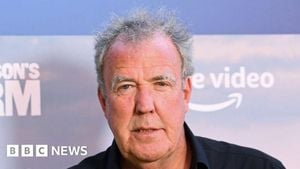At the COP29 climate summit held in Baku, Azerbaijan, nearly 200 countries reached a momentous agreement on Sunday to provide $300 billion annually to support developing nations in combating climate change. This deal, hailed as historic, marks a significant step forward but has faced stern criticism from various delegates, with many arguing it falls short of what is truly needed to combat the growing climate crisis.
The new finance goal directly supersedes the previous commitment by wealthy countries to provide $100 billion per year—a target originally set for 2020 but which only came to fruition two years late, by 2022. This new target aims to see developed nations step up their contributions as global climate challenges intensify.
While some delegates celebrated the agreement, applauding it as progress in addressing climate-related impacts, others, particularly representatives from developing nations, expressed disappointment. India's delegate, Chandni Raina, strongly criticized the document, stating, “I regret to say this document is nothing more than an optical illusion” and emphasized the urgency for more substantial commitments as climate ramifications escalate worldwide.
United Nations climate chief Simon Steill called the agreement "an insurance policy for humanity," stating: "It has been a difficult path, but we’ve delivered this deal. This deal will keep the momentum of clean energy alive and protect billions of lives." He also cautioned, “the success of this insurance policy relies on full and timely payments.”
The negotiations at COP29 extended beyond the conference's scheduled conclusion, with talks stretching late and fraught with contention over how the promised funds would be allocated, as well as the responsibility of wealthier nations to compensate those most affected by climate change. Several representatives from poorer nations walked out during heated discussions, concerned about transparency and their inclusion.
This debate isn’t just theoretical; it has significant real-world applications. Developing nations currently face dire consequences from climate-induced disasters. Recent events underline the urgency: major storms ravaged the Philippines, causing catastrophic losses to infrastructure and agriculture, exacerbated by extreme weather patterns tied to climate change.
During the summit, wealthy countries pledged to raise financing for climate projects, focusing on initiatives such as renewable energy development and disaster preparedness. This commitment is pivotal for ensuring developing countries can transition away from fossil fuels and build resilient systems capable of withstanding climate disruptions.
Despite the optimistic projections surrounding this new financial framework, skepticism looms large. The agreement includes provisions for private sector participation to help meet the ambitious $1.3 trillion annual target by 2035—a figure environmental experts believe is necessary to properly address climate change. Critics argue much of the financial aid will likely manifest as loans, potentially compounding the economic difficulties of nations already grappling with financial instability.
Notably, as climate financing discussions unfolded, backdrop issues emerged, including the influence of forthcoming political shifts, such as the recent election of Donald Trump, who has historically downplayed climate science. This raises questions about the sustained commitment of the U.S. to international climate agreements.
Disparities between wealthy and poorer nations remained palpable throughout the conference. With nations like China and several oil-rich Gulf states encouraged to participate, the overall contribution structure remains contentious.
Participants at COP29 highlighted the funding deficiencies relative to the scale of the crisis. Some labeled the newly established $300 billion target as merely rehashed aspirations from previous commitments, and quite insufficient for the mounting challenges faced by vulnerable communities worldwide.
The environmental and humanitarian stakes could not be higher, as climate-vulnerable nations continue to urge wealthy governments to uphold their historical responsibility for climate impacts. The success of COP29’s deal will not merely be measured by dollars pledged but by the actual impact those contributions can make for those who face the wrath of climate change everyday.
For developing nations, every dollar counts, and even with the promises made, many remain skeptical about how fully these pledges will be realized. Future discussions and actions will be closely monitored, as global attention remains firmly fixed on whether this agreement will translate from paper to significant climate action.
The world has entered what many call the climate age, where commitments of this nature will define the legacy of international climate negotiations. Whether COP29 is the tipping point for meaningful change or just another chapter in the historically slow progress of climate finance remains to be seen, but the urgency for action could not be clearer.



